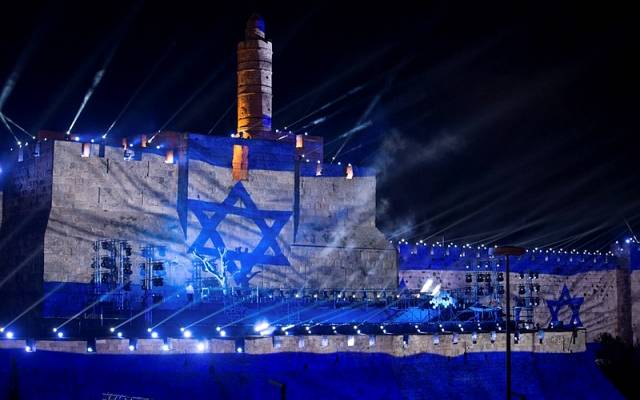Upgrades were initiated to enhance the museum experience at the Tower of David through sound, light, music, dance, drama and high-resolution digital technologies.
By: Eliana Rudee, JNS.org
The Tower of David may be 2,000 years old, but some of its most spectacular features are now brand-new. In fact, the latest mechanisms use cutting-edge technology to present Jerusalem’s story to a whopping 400,000 visitors per year.
These developments include a recently launched innovation lab; a renewed and expanded Kishle building, featuring layers of Jerusalem’s history in one building; and the tower’s second light and sound show that will open to the public on April 1 (no fooling!).
Each of these upgrades were initiated in the context of the Tower of David’s mission to boost the museum experience through sound, light, music, dance, drama and digital technologies.
According to Caroline Shapiro, director of international public relations for the Tower of David Museum, in the context of access to the proprietary essence of museums from the comfort of personal homes and smartphones, museums must curate engaging messages for audiences, rather than simply expose the public by displaying an artifact. “Technology today is a huge part of that,” she tells JNS. “While technology is working against museums, it’s also used to enhance a visitor’s experience.”
As such, the Tower of David opened an innovation lab in January—the first of its kind in Israel—that seeks to integrate, pilot and develop tech solutions to support and enhance the visitor experience. For start-ups and industry leaders, it offers a workspace, equipment and a real time beta site; for guests, the use of augmented reality (AR) and virtual reality (VR) revolutionizes the museum experience and engages attendees in the digital age.
“It is the only innovation lab in the world to be housed in a tower built 2,000 years ago,” declares Eilat Lieber, director and chief curator of the Tower of David Museum. “This building was the technology of the past, and in this building, we see the technology of the future. By using the right technology, history will come alive.”
According to Devora Mason, director of the innovation lab, it not only contributes to Jerusalem’s position as an internationally recognized AR/VR center, but creates a desire to “come and be part of Jerusalem.”
“It’s like the VR of Birthright,” she tells JNS. “Unlike 2D images, virtual reality creates empathy, so this could make people connect with Israel even further.”
‘We Must Play the Game’
Another upgrade to the museum that will use AR/VR technology is an expanded Kishle building, including a new opening in the outer wall constructed in January as a first step in establishing a world-class, multi-media archaeological center in the Kishle.
The Kishle building was erected as a military compound in 1834 by Egyptian ruler Ibrahim Pasha and later used as a prison during the British Mandate period.
The vision is to transform Kishle into a large visitor site, highlighting the archeological center within the historic structure alongside a new, two-story entrance and exhibition gallery building with modern conveniences, and plenty of space for lectures and events.
According to Jerusalem’s chief archaeologist at the Israel Antiquities Authority Amit Re’em, the goal is to appeal to the young generation. “In my dreams, I see holograms rising from Herod’s retaining wall and speaking directly to the guests,” he tells JNS. “While we must be careful to keep it as a respectable site, we must also play the game of AR/VR to explain these ancient remains.”
Show Set to Open April 1
Last, but not least, the new sound and light show at the Tower of David is set to open to the public on Sunday, April 1.
The first “Night Spectacular” opened in October 2008, portraying the story of Jerusalem through images, characters, color, light and sound projected onto the tower’s walls. To date, the show has attracted more than 2 million guests, illuminating archeological ruins and hidden pathways of the citadel for guests in an enveloping multi-sensory experience.
The new Tower of David presentation, together with the Israel Ministry of Tourism and the Jerusalem Municipality, tells the story of David as he goes from shepherd to king. It features the work of Marc Chagall, Henri Matisse and Michelangelo in a tribute to the artists, painters and sculptors who immortalized the image of Jerusalem’s King David. It makes use of 20 speakers projecting an original musical soundtrack written by Étienne Perruchon, in addition to 18 powerful new laser projectors that will illuminate the citadel with 250,000 lumens and 35 million pixels in vibrant and high-definition images under the Jerusalem sky.
Ariela Rajuan, director of the Jerusalem Municipality’s Culture and Leisure Administration, says “the new night experience will continue to turn Jerusalem into an attractive and successful city.”
Likewise, Director-General of Israel’s Tourism Ministry Amir Halevy calls the new-and-improved features at the Tower of David a “very important product” that will keep up Jerusalem’s tourism momentum and offer “one more reason to stay another night in Jerusalem.”
